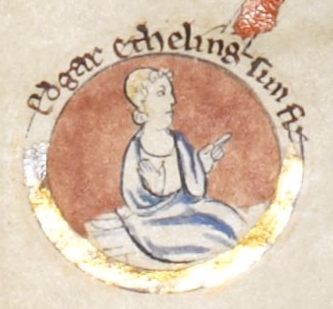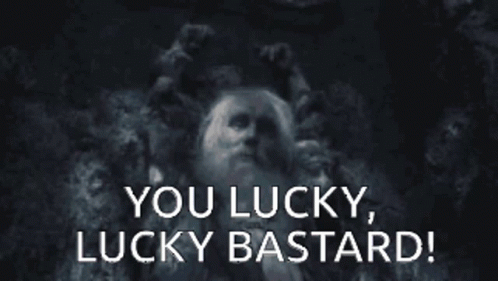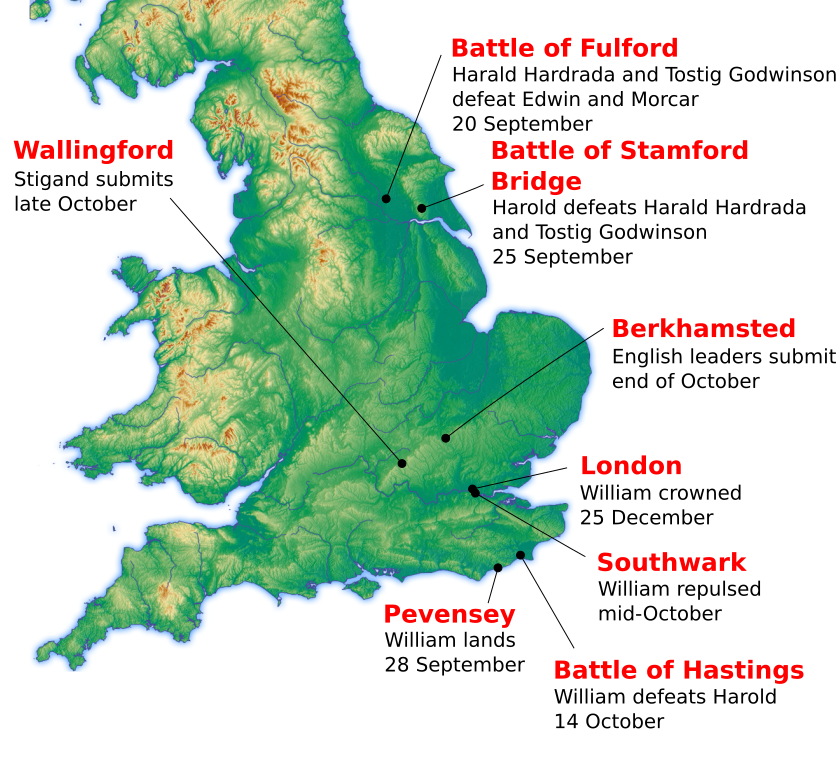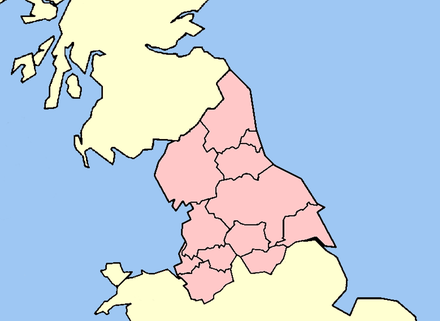Back to Harald we go. No, the other one. When he came over from Norway to kick the son of the Earl of Godwin (Godwinson, get it?) off the just-vacant English throne, he brought with him another enemy of the then-king, but paradoxically also a claimant, so not quite sure how that worked. Tostig has already been mentioned, Harold’s brother whom he exiled from England, but who believed he jolly well had just as much a right to the crown as his sibling, dash it all, and decided to support the Norwegian king, perhaps in the hope he might be granted a duchy or a baronetcy or some damn title with a lot of land anyway. Okay, let’s unpack this.
Tostig had come with his army to take the throne but had been driven off by his brother, and instead decided to head north, where there were always arses to kick. Unfortunately, these arses kicked back, so to speak, and Tostig was harried by the Earls of Mercia and Northumbria, and he lost most of his men. He decided to go to Scotland and lick his wounds, and maybe see if he couldn’t scare up some support there. The Scots were always on for a fight, after all, and there was little they hated more than the English. Of course, he was English too, so there was that. As it went, King Harald, the Norwegian one, was cooling his heels on the south coast, looking at his watch and wondering where the hell this WIlliam character was, said to meet him on the south coast 1066, and here it was and no sign of him. It was then that his men came to him and said “Look Your Majesty, we’d love to stay and die horribly in your service, get mutilated and maimed for life all to get you this throne your heart seems set on, but the thing is, we’re militia, see, and, well, we have these crops that need to be harvested.” So off they went to return to a much safer life as farmers (unless you happened to get in the way of the local lord, who might just that morning have arisen with an insatiable desire to mow down farmers, the things these lords get up to, I don’t know) and Harald was kind of left armyless.
So he moseyed on up north, which seemed to be the in-place to go, where he met a rather despondent Tostig. “How many men you got?” he asked him possibly over a few pints of good dark ale (or, being the north, possibly grey ale, and also possibly not good). “Not much,” belched Harald maybe. “A mere 300 ships, no more than 15,000 men.” Tostig may have grinned and the two may even have clinked glasses, who knows? “That’ll do for me,” it’s possible Tostig may have said, having perhaps spent too long among northerners, and so they banded together and went to kick the king out of the royal palace. As for William, well, Harald may have thought philosophically, he may turn up, he may not, but this guy has an army here and now, and I’ll be buggered if I’m spending another season pulling my dick in this cold climate waiting for him.
At York, at the end of September, Tostig was able to have his revenge on the two earls, whom he and his new ally sent running like girls maybe as they roundly defeated them at the Battle of Fulford. Had they waited for Harold Godwinson, who had texted ahead saying there was heavy traffic on the A40 maybe, they might have triumphed, but as ever in English politics (and not just English of course) nobody trusted anybody else, and the two earls thought maybe Harold would set Tostig up as Earl of Northumbria. The other earl, Edwin of Mercia, may have shrugged that that would suck, but what had it to do with him, and may have been answered by the reminder that there was also a Norwegian bastard involved, who might fancy Edwin’s earldom. So stung into action, the two decided **** Harold, we can take these two pussies.
They were wrong.
So when Harold did finally huff and puff his way up the motorway he found his allies nothing more than a rapidly-receding cloud of dust, with Harald and Tostig there going “Now, about this throne.” They met at Stamford Bridge, and in true Chelsea home style, there was a massacre. 2-0 to the English king as he not only defeated Tostig and Harald, but killed them both. The exertion, however, left his forces depleted, and all he could probably think was that this would be the worst time for, say, an attack to come from across the sea.
He had barely a month to wait.
Of course, I’m sure we all understand well enough that it wasn’t as if William texted Harold - “You, me, Hastings. Be there.” In fact, neither probably had any idea where the decisive battle would be, and like any king (or in this case, duke, but soon to be king) landing on foreign shores he was invading, William had a lot of raiding and harrying and possibly raping to do as well before he got to grips with his enemy. His power had obviously grown by now, and I don’t know whether you could call him the de facto king of France, but he was certainly able to muster men from Flanders, Brittany and other parts of France to fight for him, and though as ever historians disagree over the size of his force, it’s generally accepted to have been somewhere between the 7,000 and 10,000 mark. Hard to be sure, as contemporary historians and present ones never get on: if they see each other at the bar, watch out and hold onto your pint. Naturally, those on William’s side would have been exaggerating to make him look more of a threat than he was, but it’s never possible to be sure. So we stick with this range.
Doesn’t seem that huge really. King Harald only brought about 15,000, and his army was considered large. Well, as they say, it’s often not how big it is but where you stick it, and William stuck it to the English. Let’s not forget Harold’s men were also shagged out after the Battle of Stamford Bridge, and a fresh army with a duke eyeing his crown was really the last thing he needed right now. Right now though, was exactly when William came, and he landed in England only a few days after the battle, Harold’s army limping home and looking forward to putting their feet up with a cuppa and a copy of
Soldier Times or whatever. Sussex was where he made his invasion, setting up a wooden castle (huh?) at Hastings and using it as a base for attack. Since this was Harold’s stomping ground, the idea was to lure him there by wrecking everything around, levelling his relative’s castles and basically causing **** all through the neighbourhood till the king came to ask them nicely to keep it down if they wouldn’t mind, there were people trying to sleep, and Mildred at number ten had a newborn that just would not ****ing stop crying.
But when he got the e-vite that was it, and it would be rude not to respond, so off he went to Hastings. He set up defensive camp on Saulac Hill, hoping to surprise William, but the duke’s scouts were out and about and had probably recognised Harold due to the crown on his head or something. Anyway, they legged it back to tell their master the English ruler was on the way, and William rode out to meet them. It was October 14 1066, the day everything changed for England. In a stunning piece of irony, those little quirks history is wont to throw up from time to time, the place where the battle actually took place was called, um, Battle. It still is, and I assumed it had been renamed for the famous confrontation, but it seems it has always had that name. So in effect, it wasn’t really the Battle of Hastings, but then, the Battle of Battle 1066 would just be silly, wouldn’t it?
Anyway the battle lasted pretty much all day, and as you know, I don’t do all this battlefield historians ****e; not interested in who made a pincer movement or who cut off who from their forces, who took this flag or that ridge or any of that bollocks. But I’ll see what I can pick out from the details, see if there is anything I should be writing and telling you about. Okay, I see there was a rumour started that William had been killed, and the army began to panic and retreat, the English pushing forward until the man himself appeared, shouting rather unnecessarily that he was alive, and led the counter-offensive as the English wet themselves and fled. Incredible as it may seem to us, but perhaps a totally English thing (and observed by the French too) the two armies appear to have broken for afternoon tea, taking a rest and getting their strength back. Bah! Wouldn’t have happened at El Alamein, I can tell you that!
Nevertheless, once Harold went down that was that. Again with the differing accounts, but whether it’s the truth or just the accepted one, the later Bayeux Tapestry has the famous drawing of the king being shot in the eye by an arrow and thus being killed. That may not be the case, but it’s passed down into legend and popular history, and who am I to dispute it? Although some of his men rallied around the king’s corpse and fought to the end, as in most battles, once the leader is slain the army is out of here, and so they were. William had won the day, and the last English king had bit the dust. A lot of long-winded explanations and theories over how and why William triumphed, but they seem to be mostly centred on the English attacking when they should have been defending (Newcastle United anyone?), being fooled by the feigned retreats the Normans pulled off during the battle, only to be led into an attack, and their lack of cavalry, which would always remain one of the Normans’ biggest advantages.
A decisive and stirring victory it may have been, and indeed the beginning of the end for English rule, but if William thought the country was going to fold like a pack of cards and meekly accept a frog as their new sovereign, well, he was about to find out he was in error.
 Edgar Atheling (1052 - 1125 or possibly later)
Edgar Atheling (1052 - 1125 or possibly later)
We’ve heard of him before. He was the son of Edgar the Exile who, once his exile was over, returned to England only to earn a new name: Edgar the Dead. With so many powerful claims to the throne on the death of Edward the Confessor, and he being so young, still in his teens, at the time, Edgar Atheling was not really considered a runner, and Harold Godwinson was crowned instead. When Harold fell, and William began his march towards London in order to take the crown that was possibly rightfully his but never mind if it wasn’t, he had won it by right of combat, the English elected Edgar as king. He never ruled though. In Southwark he fought with the English for control of London Bridge, unable to gain access to the city, he expected to encounter only token resistance at the bridge, but one of the leaders of the defenders, a man called Ansgar (or Esegar), the sheriff of Middlesex, had been with Harold at Hastings, and had returned to Southwark to organise its defence.
William, somewhat nonplussed to see such a force arrayed against him - even the townsfolk were armed and joined the effort - offered Ansgar the sheriffship under his rule if he would submit to him, but Ansgar told him where to stick it and they attacked. You have to give it to this guy: he was so badly wounded he had to be carried around in a litter, and had been offered pretty generous terms by the victorious duke, soon to be his king. If he recognised him not only would he be allowed retain his lands, but he could also have a seat on the council. Now, you can’t say fairer than that, can you? But England doesn’t like invaders, especially ones who rub out their kings, and so there was no compromise.
It’s possible those two earls, he of Mercia and the other of Northumbria, were there defending the town too, and though William’s cavalry broke through, they faced such stiff opposition that they could not hold the bridge, so they set it ablaze, and Southwark was virtually razed to the ground. London continued to put up stiff resistance until the clergy, convinced by William that they should concede, swore their fealty and he was allowed enter the city. He was crowned the first Norman king of England on Christmas Day.
His first few years, however, were far from easy or peaceful. England had been battered into submission, with the only real alternative to William - now known forever more as “the Conqueror” - being the weak and ineffectual and inexperienced Edgar Atheling, and really nobody wanted to rally behind him. When William returned to Normandy in March though, the English took their chance and revolted here there and everywhere, leaving his half-brother Odo, and his partner, William Fitzosbern with rebellions to put down, which they did. William was back at the end of the year and took a hand in suppressing the revolts himself, the great strength of his policy being what would become a feature of Norman conquest, not only in England and Ireland but everywhere: he built castles and installed garrisons there, so that there was no chance of rebels getting too uppity again. If they did, there was a ready-made force there to take care of them.
But then there were rebellions and there were rebellions, and one definitely demanded his own personal attention.
The Harrying of the North: No Mercy from the Normans
In late 1069 the north rose. To almost paraphrase and parallel
Game of Thrones, winter was coming and the north had united behind Edgar. I don’t know if they proclaimed him “King in the North” or anything - most likely not; they’d have wanted him to have been recognised and acknowledged as king of all England - but they rallied and stood against William, still more or less at this point seen as an invader, and a Frenchman to boot. England had not forgotten the old rivalry with France, and this guy might call himself a Norman, but he came from France, and that was good enough for them. England - and Ireland - would of course have cause to hate and revile the word Norman over the next few hundred years, even more than it had hated the word French. What became known as “the harrying of the north” was only the beginning.












 Linear Mode
Linear Mode
